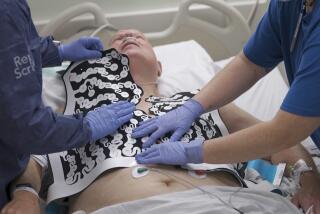Stem cells: Coaxing the heart to heal itself
- Share via
Scientists at University College London have been able to coax cells in the hearts of adult mice to grow new, beating heart tissue.
The work, described Wednesday in the journal Nature, is part of a body of research that fuels hopes that someday scientists will figure out a way to stimulate stem-like cells in adult human hearts to mend the damage caused by heart attacks.
Cracking that nut is one of the foremost challenges in cardiology. About 5 million Americans suffer from heart failure, their hearts weakened permanently by heart attacks or other conditions. Unlike other parts of the body — think of skin, for example, which usually heals easily after a cut — damaged hearts cannot repair themselves. But if researchers could figure out a way to make the heart regenerate and reverse the damage caused by heart attacks it could improve the quality and increase the duration of many lives.
One challenge: figuring out which, if any, cells in the heart have the capacity to grow new heart muscle, a question numerous researchers are probing.
In search of such cells, the British team targeted so-called progenitor cells in the epicardium, the outer layer of the heart. During early development, these progenitors can become heart muscle or blood vessels that help support the heart, the team reported, but in adult organisms they’re dormant. The researchers treated the hearts of healthy mice with a protein called thymosin beta-4. They then injured the hearts and delivered a “booster dose” of the protein, which “sparked” the progenitor cells to create new heart muscle, according to a press release from the British Heart Foundation, which bankrolled the research.
“[These] represent in our view a bona fide source of new muscle,” lead author Paul Riley of University College London’s Institute of Child Health said at a news conference Wednesday.
The new heart muscle went to the right places in the injured mouse hearts, he added, linking to other cells and functioning correctly. The regeneration process didn’t work in cells that weren’t pre-treated with thymosin beta-4.
The research won’t spawn cures anytime soon. But, Riley suggested that one day patients at high risk for a heart attack might be able to take a pill that could “prime” their hearts to repair themselves if and when a heart attack occurred.
Any such treatment for heart damage would sidestep problems associated with transplantation of cells and tissues such as immune rejection, the authors wrote.
RELATED:
Booster Shots post on another heart stem cell paper.





